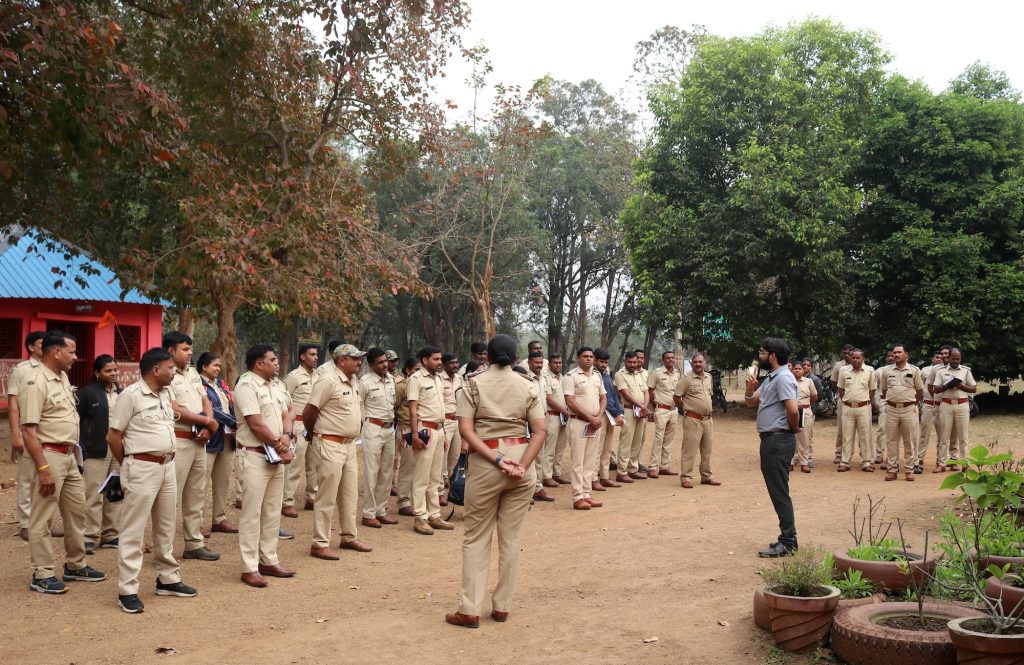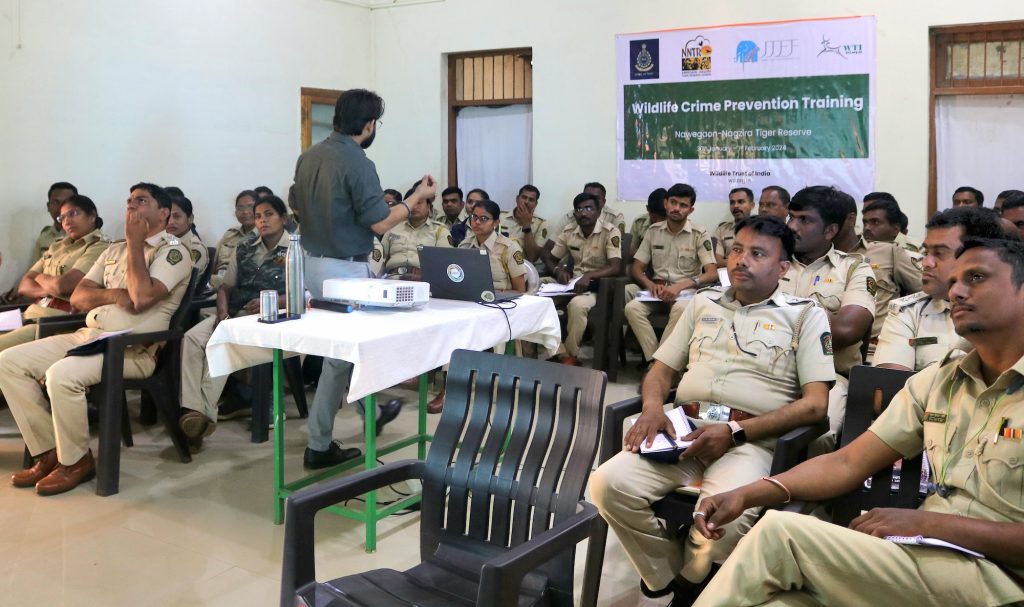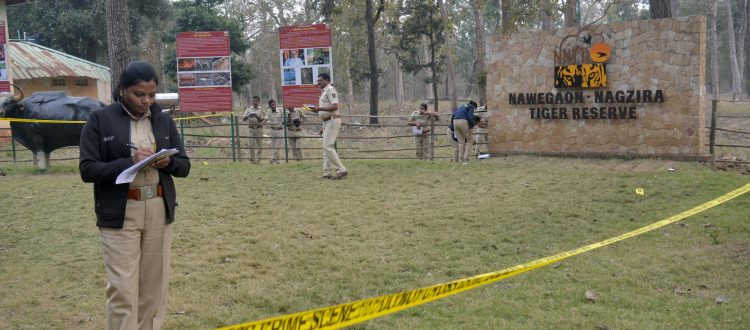Wildlife Crime Prevention Training in Nawegaon-Nagzira Tiger Reserve
Maharashtra, 1st February 2024- Wildlife Trust of India (WTI) and the Maharashtra State Forest Department in collaboration with Japan Tiger and Elephant Fund ( JTEF), conducted a three-day wildlife crime prevention training in Nawegaon-Nagzira Tiger Reserve (NNTR) from 30th January to 1st February for nearly 50 frontline forest staff. The workshop focused on the new amendments of the Wildlife (Protection) Act,1972 and provided an effective method to enhance the impact of efforts on ground by frontline forest staff from Umzari, Pitezari, Koka, and Nagzira ranges in NNTR.
NNTR is Maharashtra’s 5th tiger reserve; situated in Gondia and Bhandara districts of the state, bordering Madhya Pradesh and Chhattisgarh, in Central India. The core of the tiger reserve has an area of 650 square kilometres with a buffer consisting of 1241.41 square kilometres; with five different protected areas (Nawegaon National Park, Nawegaon Wildlife Sanctuary, Koka Wildlife Sanctuary, Nagzira Wildlife Sanctuary, New Nagzira Wildlife Sanctuary). It is a critical tiger habitat with 12 tigers recorded in the 2022 tiger census report, and an important corridor for the survival of tigers in the landscape. This tiger reserve links the major Protected Areas in Vidarbha, as well as two class-I TCLs, the Tadoba Andhari Tiger Reserve and the Kanha Tiger Reserve; where more than 75% of the corridor habitat falls outside the PA network. The landscape also has a great diversity of floral and faunal species.

Nearly 50 frontline forest staff participated in the workshop | Photo by WTI
Deputy Director Pawan Jeph, along with the Range Forest Officer from Umarzari Range, Ms. Sapna Thembure inaugurated the training session, which was attended by forest guards and range officers of NNTR with sessions being conducted by WTI expert trainers.
The session commenced with a pre-test to gauge an understanding of the forest guards’ knowledge of wildlife crime prevention. This was followed by a session on wildlife offences, as well as the different types of wildlife offences outlined in the Wildlife (Protection) Act, 1972 (WPA). This also covered varied methods of hunting and detection including anti-snare and anti-electrocution drives.
The training encompassed key definitions used in the WPA, and major offences such as hunting, poaching, destruction of wildlife and protected areas, and illegal wildlife trade. Practical sessions included mock wildlife crime scenarios to teach the officers how to investigate and document a crime scene effectively. ; a The training also focused on supporting Acts of CrPC (Code of Criminal Procedure), Evidence Act and Arms Act, followed by the session on documentation of the Wildlife Offence Report. Special emphasis was given to apprise the staff on the amendment to the WPA, i.e. the provisions under CITES (Convention on International Trade in Endangered Species of Wild Fauna and Flora.), the emerging illegal exotic pet trade in India, wildlife article identification and on commonly traded wild animals. The wide range of topics that were taught during the training are important aspects of wildlife crime prevention; that have provided the frontline forest staff from NNTR more clarity on how to be guardians of wildlife. To gauge the effectiveness of the training and knowledge level from the training; a post-test was conducted which revealed a 20.4% increase in knowledge, with an overall average score of 71.2%.
The workshop concluded with a ceremony and a vote of thanks; along with the distribution of field kits containing backpacks, jackets, caps, water bottles, rainproof jackets and pants, torches, fibre sticks and Wildlife (Protection) Act, 1972 books to the participants.
Forest guards who had attended a similar training in 2011 in NNTR; remarked on how this training refreshed their skills and knowledge while also providing updated and new insights into wildlife crime prevention. The participants expressed their gratitude for the opportunity to learn about these crucial issues, sharing a keen interest in crime prevention and its potential impact on their careers. While sharing experiences about the training workshop; Ms Sharda Gajanan Ingale (Forest Guard, NNTR) explained, “Many times officers make mistakes while preparing a document having legal bearings that record evidences and findings at the scene of a crime, and this training will definitely impact our day to day patrolling in the forest beat, investigation of wildlife crime incidences, how to effectively present crime cases in court which we failed many times in the past because of the lack of knowledge, and now enter a new analytical way of handling wildlife crime cases.”

The workshop included classroom tutorials and practical training sessions | Photo by WTI
Appreciating the training, Deputy Director of NNTR, Shri Pawan Jeph said, “ I am thankful to WTI for organising this training for the NNTR staff. This training would certainly strengthen the capacity of the frontline forest staff in investigating and preventing wildlife crime, and increasing the protection level of the Nawegaon Nagzira Tiger Reserve.”
A similar training was conducted in NNTR for frontline forest staff in Nawegaon Park Range, Bonde Range and Dongargaon Range in September 2023. It emphasised on basic ecological knowledge, patrolling, wildlife crime, criminal investigation procedures, effective utilisation of the Wildlife (Protection) Act, 1972 and Wildlife (Protection) Amendment, 2022 as a legal tool for booking cases; along with illegal wildlife article documentation, cyber wildlife trade; as well as field training on tracking wildlife and snare identification. Over the past 25 years, WTI has been conducting wildlife crime prevention trainings across the nation for frontline forest staff to help enhance conservation and wildlife protection efforts.
WTI has been working in the Nawegaon-Nagzira Tiger Reserve landscape over the past two decades, collaborating with the forest department while training frontline forest staff in wildlife crime prevention, conducting anti-snare walks and anti-electrocution walks, and also providing legal assistance when needed. These classroom workshops and field sessions held by the WTI team have worked towards capacity building and strengthening of the staff and thus helping in preventing wildlife crime in the tiger reserve.









